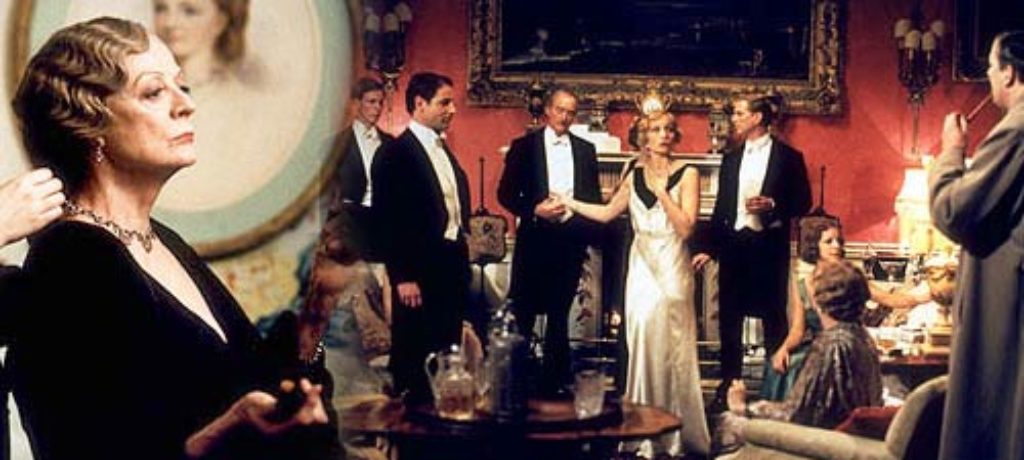
As one can observe by the partial credits listed here, Gosford Park is the very definition of an ensemble effort. Director Robert Altman has assembled a horde of Britain’s best actors to create a film about an aristocratic murder that will, unfortunately, befuddle most of us working-class Americans.
On one level Gosford Park is a simple, retro, formulaic whodunit flick. Was it the butler in the drawing room with the kitchen knife? Or the valet in the den with the poison? But never mind the mystery, Altman is much more interested in creating a tapestry of colorful personas—visages that float and dance throughout the film, framed inside layer upon layer of vignettes.
Halfway through the movie, most theatergoers won’t even know who the main characters are. You’re pretty sure Sir William and at least two of the maids (Mary and Elsie) are going to come into focus, but as for the rest, the guessing has only begun. And that’s just Altman’s style, which was good enough (at least in the mind of The Academy) to win a Best Picture nomination.
At the risk of sounding anti-intellectual, Gosford Park plays out like a century-old version of Big Brother. A bunch of people are trapped in house, bickering, fighting, eating, competing, necking in hallways and having sex. Instead of occupying a prefab flat constructed on a Hollywood back lot, here the rich and the royal have gathered at Sir William’s grand estate in England for food and pheasant hunting. Naturally, they’re not allowed to leave when—about an hour and a half into the film—murder spoils the party. Everyone’s a suspect. Let the deals, alliances and back-stabbing begin.
positive elements: Setting his tale in 1932, Altman scratches the surface of society’s shifting social classes. Henry Denton, who is a Hollywood actor posing as a valet, infiltrates the ranks of the servants. His actions highlight the inequities. The pain of being “forced” to give up one’s child is explored as the past of one of the servants comes to light. She had had a child out of wedlock and, to preserve her employment, she put the baby in an orphanage. She has regretted it ever since.
nudity and sexual content: The servants in Sir William’s house are particularly amorous, cavorting behind closed doors and in closets, making out and having sex. Numerous times the camera pans past clinched couples in various stages of undress. Mary and Elsie take turns bathing (the camera gazes down on bare backs and carefully obscured breasts). Before her bath, Elsie wears a revealing slip. It is intimated that Henry has sex on two occasions with one of the upper-crust ladies and tries to forcibly bed Mary (she resists and is rescued when another servant enters the room). A vague reference to homosexual attraction is made. And Sir William fondles Elsie’s breasts under the guise of rubbing dog hair off her blouse.
violent content: A man is stabbed. Henry forcibly tries to subdue the struggling Mary while he kisses her. Pheasants are shot.
crude or profane language: Seven f-words and two s-words tumble about amongst a few other milder profanities. Christ’s name is misused about six times.
drug and alcohol content: Nearly everyone, from the lowliest servant to the mightiest houseguest, smokes. Cigarettes. Cigars. Pipes. Alcohol is served with every meal and the men guzzle great quantities after each meal.
other negative elements: Mary concludes in the end that it would do no good to tell the police what she knows about the murder because, “what purpose could it possibly serve, anyway?” Nobody liked the victim. And Mary likes the guy who’s guilty (or is he?). Therefore, it’s okay to keep it all to herself. Need I explain why that’s a terrible thing?
conclusion: Outside of its vast array of vividly sketched characters Gosford Park is a rather mundane British murder mystery. Still, it’s not afraid to make fun of itself by including a subplot about a Hollywood filmmaker in the process of making a British murder mystery. Alas, the joke falls flat. Henry asks one of the maids if the Brits have any sense of humor at all. Her response? “Yes, when something’s funny.” Indeed.
Subtlety Gosford Park has aplenty. And the appreciation of such low-key storytelling has become something of a lost art. Altman makes significant comments through his characters about class divisions, gender relationships, marriages, wealth, bitterness, greed and lust. But they’re all buried. Deeply buried. I got the feeling that if I watched the film three or four more times, I would begin to truly appreciate the depth intended. But by the time the credits rolled, I had no desire to do so. The overall story wasn’t compelling enough on an emotional level for me to want to come back for more. I wasn’t invested in any one of the characters enough to want to take the journey again.
“The movie spends all its 137 minutes convincing us how dazzlingly intellectual it is,” wrote Christopher Null for Filmcritic.com. That’s exactly why Oscar came calling. And it’s exactly why The New York Times gushed, “A virtuoso ensemble piece . . . in its masterly interweaving of multiple characters and subplots.” But it was Eric Lurio of the Greenwich Village Gazette that got it just right for masses of moviegoers everywhere: “If you’re an Anglophile, you’ll enjoy it. If not, don’t bother.” I can add only one bit to that. If you think you’re an Anglophile because you loved Sense and Sensibility, you still needn’t bother.
